- Home
- Anna Kavan
Let Me Alone Page 3
Let Me Alone Read online
Page 3
‘No,’ she said slowly, as if reluctant.
He laughed sharply, with a curious sound of gloom.
‘But, you see, there is no God, so we can insult the image with impunity.’
Anna watch, fascinated, as his thin lips pursed themselves together, and a little globe of spittle, shining like a ball of quicksilver in the sun, fell through the air on to the patient Christ.
There was a very blank silence. The spittle elongated itself and ran down slowly over the little figure, tarnishing the sun-dazzle of the silver, down towards the flat, smooth palm beneath.
Anna was a little bit afraid. True, she had almost forgotten Miss Wilson’s religious teaching. But her child’s mind was impressed by the effrontery of the gesture, the desire to insult and wound the little Christ-figure. She half expected that the heavens would fall. But nothing happened. The sky arched up, translucent and serene, above the ragged tops of the mountains.
And suddenly, James threw the crucifix away. With a slight flick of his hand that was in itself an affront, he flicked the little cross up into the blue air. It cut through the blueness, a small glittering arc, and slipped down among the stalks of the coarse grass.
‘Religion is a drug, and to take drugs is degrading,’ he said. ‘You must learn to look life in the face. Throw away your cowardly drugs, and see the truth, the ugly, cruel, ungodly truth, as it really is.’
And he went away laughing, laughing at Anna, and left the crucifix lying there.
She did not pick it up. And the next day, when she came back to the place, it had gone. Perhaps Seguela or Paul had found it and taken it away. She did not ask them.
But all the same, her father was well disposed towards her. It was strange how Anna always felt that he wished her well. James cared for no one and for nothing. But just the one slender tie that bound him to Anna, this he could not break. There was a queer thread of subtle relationship between them, almost like a secret understanding. No, he couldn’t throw off the sense of obligation to Anna. But at the same time he cherished a sort of grudge against her; a grudge of profound, ironical pity that was in some way directed against himself. He almost wanted to destroy her, to put her out of the way, as one puts a small animal out of life. She was like an animal to him, a young, useless animal that nobody wanted and for which there was no place in the businesslike world. And the responsibility rested upon him. He saw only misery for her, and the frustrations which he himself had suffered. It was a reflection upon himself. He would have liked to put her out of the misery.
Anna was pleased when he began to teach her. Miss Wilson had taught her to write, and to read from an old book in a worn black binding – Reading Without Tears. And now James began to teach her Latin and Greek, the languages he was fond of and which seemed to suit his personality. The books in the house were nearly all classics. He was writing his own intimate diary in Greek; a fat, faded brown leather book, full of the strange, neat little symbols in James’s beautiful script.
He was not a good teacher. The slightest trace of slowness on the part of his pupil was unendurable to him. At the faintest sign of wandering attention he would break off the lesson. There were many days on which he would not teach at all, driving Anna away with sarcasm or silence. He hardly ever praised her; but his sarcastic scorn was easily and frequently aroused.
Anna was intelligent and very quick. She learnt quickly because she wanted to learn, because she wanted to do as her father did, to read what he read, to imitate him. She wanted to be like him, to win his difficult approval. But also she wanted the learning for its own sake, for some subtle satisfaction it bestowed upon her. Quite soon she was reading from the plain, brownish books that were arranged so neatly in the dark, bare room.
She spoke with equal facility English, French and the Catalan dialect used by the peasants; and she read everything she could find. Petronius and Apuleius besides the more conventional classic authors, French and English essayists and an occasional newspaper. There were no novels at Mascarat.
Everything she met with in her reading James would discuss with her – when he was in the mood – freely, as with an equal. Her mind developed rapidly. But some innate youthful dignity combined with her isolation to save her from the monkeyish sharpness, the horrible sharp knowingness of the precocious child. Only a seriousness was added to her manner, a rather unnatural gravity, like a secret weight. And her eyes had a sort of inward look, unwavering, as though a little veil hung there.
In the main, she was contented with her isolation. But occasionally a restlessness would come upon her, a longing for the presence of other children, a sort of subconscious craving for normality. Then she would set off by tracks and gulleys that she knew, to join the peasant boys and girls at a mountain farm two miles away.
Not that she liked being with them when she got there. They were uncouth and noisy and stupid, and she soon tired of their clumsy, quarrelsome games. But the restlessness seemed to drive her to them in spite of herself.
She was aware that her father disapproved of these visits, although he had not forbidden them; there were no absolute vetoes in Anna’s life. Still, his disapproval made itself felt, and troubled her.
One day James met her as she was returning, rather limp after the long climb, with a curious foiled look on her childish face. She could not understand the impulse, the restless ache, that drove her to those rough companions and sent her back again, still unsatisfied.
‘You have been to the farm?’ said James, in his still, dead voice.
Anna admitted it. She knew that he disapproved, but she was too tired to make excuses. Her small brown hands hung loose at her sides, the fingers curving inwards with an unconscious air of pathos and weariness.
Her father did not rebuke her.
‘Come with me,’ he said.
He moved in front of her like a shadow, but a shadow that has achieved a certain solidity, the sun gleaming on his smooth grey hair. There was a shadow-smoothness of movement in his limbs.
They came to an old shed, some distance from the house, where the goats were kept in winter. An orange tree grew at one side, bearing a few greenish oranges that no one ever troubled to pick. Hens were scratching in the dusty shade of the tree.
‘Stand over there,’ James said to her, pointing to the wooden door of the shed.
She went wonderingly, and stood there facing him, touching the rough, splintery boards with her hands, feeling the warmth of the wood that had been in the sun all day. The sun was low now, shining yellowish towards the sunset. The vines were tufted with new leaves that caught the slanting light and stood out burningly, row after row, fistfuls of small, green, vivid flames against the dusky earth. The mountains showed a haze of fresh greenery among the rocks.
Anna saw that her father had a revolver in his hand. His face against the light had gone dark and strange as he looked at her.
‘Keep very still,’ he said. ‘You will be all right as long as you keep still.’
Anna stood against the door of the shed, transfixed. She did not know what was going to happen.
‘Keep still,’ she heard him say again, in such quietude that it was almost a whisper, from a little way off.
Then, suddenly, the sharp crack of a shot.
She started violently as the sharp hiss rushed past her and she felt the wind of it on her face. Her heart leapt in terror. Unable to scream or move, she waited as if struck motionless with dread.
James Forrester was standing away from her, beyond the orange tree, Behind him, the frightened chickens were scuttling off in noisy, ungainly haste. On his face was a strange expression, a look of concentration that seemed to cover something else, something almost superhuman, a pure, quiet, inhuman attentiveness. She could not know it, but he was thinking: ‘If I should make a mistake now? If she should move? If I should shoot her dead? It would be an accident.’ With more than half his mind he was hoping for that accident. But not whole-heartedly. He was not quite sure of himself.
Again the sharp
smack of a shot, not very loud. Little splinters of wood flew up and touched her hair. Anna was almost paralysed with terror. Yet some part of her was resigned and even proud. She didn’t mind what her father did to her; as long as it was his will she didn’t mind what happened, fundamentally. She had such faith in him.
Crack! went the revolver again, deliberately, like a dog barking.
James was standing quietly beyond the orange tree. Against the sun his body looked very dark, rising from the dark pool of shadow from the tree. She watched him lift his revolver, carefully, deliberately, before each shot snapped at her, sinking fangs of pure terror into her heart. She pressed her fingers tight against the palms of her hands, as she stood.
Finally there was silence. The hand holding the revolver was lowered, and it did not come up again. James, with his feet in the shadow, did not stir, but stood looking at Anna.
At length, however, he moved. With the revolver in his hand he came forward and touched her, moving her away from the door. She sighed, wondering if it was all over.
‘Look at your silhouette,’ he said, smiling at her very faintly.
She looked round, and saw on the wooden door of the shed an outline of little splintery holes, the outline of her body.
She stood in the sunset, facing the outline on the door, while her father walked away. The luxurious yellow light was flooding everywhere, the mountains had a rich, uncanny gilding. She was trembling. After a time she began to walk slowly to the house, half-stunned, hearing still the frightening, sharp smack of the bullets in her ears. She did not know if the shooting had been intended as a punishment.
As Anna outgrew the clothes which Miss Wilson had made for her, they had been replaced by boy’s garments from Paralba. Boy’s clothes were more durable than girl’s and easier to obtain: and Anna herself preferred them. She wore the short trousers, in summer the cotton shirt, in winter the heavy woollen sweater, of the peasant lads; her long brown legs, very thin and brown and strong, always bare, and on her feet the espadrilles, the coloured canvas sandals bound above the ankles with criss-crossing tapes, that all the peasants wore. Her hair, thick and brown and straight, at some times was cropped short to her head, at others fell almost to her shoulders like that of a mediæval page; according to the length of time that had passed since her last visit to Paralba and to the barber. Her skin had the warm, rich, yellow-creamy colouring of a naturally pale skin that has been evenly sun-tanned.
With her straight, strong, slender limbs she was really handsome. And her shapely face, framed by its smooth line of brown hair, was sometimes beautiful. But closed, with a curious adult hardness mocking the childish features. She was in the first soft flush of youth: yet there was no trace of softness in her face. It was reserved. Even in her eyes the small veils seemed to hang, like curtains drawn before the windows of a house, behind which the owner goes secretly about his private business.
This was Anna-Marie at twelve years old, when Lauretta, moved by some tardy recrudescence of conscience, or some accident of propinquity, came once more to Mascarat to visit her niece.
James went up into the mountains and left Anna to receive the visitor alone. He had no patience with Lauretta. Anna waited with some curiosity. She could hardly remember her aunt. But there was animosity in her mind as well. She rather resented the visit and its savour of patronage.
Six years seemed to have made Lauretta daintier and younger than ever. Up she came to the rough old house, fluttering along with fragile, butterfly-prettiness, dressed in flowery blue silk, and somewhat artificial in her sophisticated girlishness. She made Anna look amazingly straight and masculine and serious, and somehow a little absurd.
‘Is it possible that you are Anna?’ she cried in exaggerated, smiling astonishment, when she first saw her.
‘Yes,’ said Anna, with her air of quiet composure that was so unchildlike.
She shook hands gravely with her aunt, and stood as if waiting, her grey eyes steady and changeless. She was tall for her age and looked a year or two older.
‘But why are you dressed like that?’ Lauretta cried, plaintively, amazedly.
She was laughing and feigning horror, but the horror was not altogether feigned, and Anna knew it. She began to smile.
‘These are the only clothes I have,’ she answered.
Lauretta gave a shrill little cry as if something had hurt her.
‘My dear child! How too terrible!, she exclaimed in exaggerated dismay, still laughing, but genuinely shocked.
She put her hands on Anna’s thin shoulders and held her rigid, looking at her, examining her with a slight, delicate, patronizing insolence.
‘She looks just like a peasant boy,’ she said to herself in real disapproval. But immediately she realized that it was not true; that comely, well-shaped face was most un-peasantlike; there was nothing of the yokel in the fineness of that slender body.
‘A Greek shepherd-boy is nearer the mark,’ she thought. ‘An Arcadian shepherd-lad.’ And for a moment her romanticism, her faculty of seeing everything in terms of romance, almost carried her away. Just for one moment she saw Anna as a romantic figure, caught a glimpse of something strange and rather charming about her. But then her practical worldliness came back and took the upper hand. Romance in the abstract was all very well; but in one’s own family, in one’s own sister’s child, something more conventional was to be desired. She became definitely the disapproving superior; the condescending but critical great-lady who finds the state of affairs prevailing among her inferiors very far from her liking. It was in Lauretta’s nature to be a sort of exacting Lady Bountiful.
Anna stood quietly, submitting to the critical, disapproving regard, with her slim brown hands that were even more delicate than Lauretta’s, hanging at her sides. She flushed slightly, resenting the criticism and the patronage. The quick blood rose under the clear, warm-cream skin, a bright light, like enmity, leapt into the grey-veiled eyes. The instinctive blood-recoil from an opposing – nature.
It was hot and airless in the house, so they went and sat at the edge of the chestnut-wood where there was a breeze blowing. Anna built a seat for Lauretta among the rocks, cushioning it with grass and the soft, greyish, fibrous moss from the stones. The sunshine, the wonderful, pure, rich mountain sunshine, like a flood of liquid gold, was pouring down upon the world. The wood was all in motion, restless and uneasy, the green leaves lifting and dipping and weaving in a watery way, so that an ocean of green wavelets seemed to have blown inland.
Lauretta sat on the rock in her flowery dress that was so unmistakably, elegantly expensive, and talked to her niece. She was trying very hard to be charming and winsome and sympathetic to the queer, uncommunicative child.
Anna was reserved and rather distant; she could not help being a little nervous with this sophisticated, elegant, unfamiliar woman, this visitor from another world. Nervous and perhaps a little envious as well. She was proud; she did not want to envy. But she could not shut herself off from the strange, other-world fascination of experienced, assertive perfection that Lauretta possessed: that and the hidden, implacable authority that lurked all the time behind her winning, smiling manner. She made Anna feel clumsy and constrained; and Anna was quite aware that in spite of all her charming kindliness she intended it to be so. Lauretta was very consciously the superior, putting Anna in her humble place with a cunning technique of apparent friendliness.
‘She despises me,’ thought Anna, ‘because I’m not beautifully dressed and because I don’t live in the same way as she does.’
She felt hurt and resentful. At one moment she envied Lauretta; the next she disliked her.
She became silent. The occasional words fell with difficulty from her lips. Her bright, steady, steel-cold eyes never altered. She maintained a sort of steely blankness towards Lauretta, the inevitable enemy.
It made Lauretta angry. She was definitely repelled, this time, by her niece. The tall, quiet, boyish, unchildlike little female with her cold, impe
rsonal grey eyes was really repulsive to her. She could not bear the temperate, almost inhuman steadiness of those grey-blue eyes. And she couldn’t bear the self-contained reserve of the strange girl, resisting her own charming advances. She went away in anger.
Anna’s mind was troubled by the visit. Was she missing something? she asked herself. Wasn’t there, perhaps, something admirable and amusing about the life of the world, the life from which she was completely cut off? And wasn’t something lacking in herself?
James Forrester returned at twilight when the small wild lupins in the grass glimmered white and ghostly like miniature turrets of phosphorescence.
‘A pleasant afternoon?’ he said to his daughter, smiling.
And for a moment on both faces, the grey, grim, haughty face of the man, and the brooding, pale-dark face of the child, the same smile rested, the secret, inward smile of understanding which came from the blood, glamorous.
‘I don’t think my aunt liked me very much,’ said Anna, smiling upwards, a bit cunning in the dusk. ‘She tried to make me feel ashamed of myself.’
‘And did she succeed?’ he asked.
‘No!’ Anna said loyally, and her eyes flashed.
But the father knew that she did not speak the truth.
Anna could not have told when it began; when first she was aware that something new and rather sinister had crept into her relations with her father: a new element. The element of fear. Perhaps it had started on the day of the shooting, when she had stood with her back to the goat-shed in the voluptuous yellow glare of the sunset. Or perhaps it had been born long before, with its thin roots like black worms twisted into the far distant past. But somehow fear had risen. And now its ugly, flat, dangerous head was always rearing up at her out of the bland innocuousness of everyday, as the venomous little vipers would suddenly poke up, hissing, from the sun-warmed rocks.
It was lonely at Mascarat, and the wind came swooping down from the mountains, making wild, maritime noises in the chestnut-forest, shuddering and whining through the draughty old house. Anna had never realized till now the isolation, the complete, black isolation that shut her up alone with her father, absolutely, like the banging of a trap-door. Particularly at night.

 Machines in the Head
Machines in the Head Ice
Ice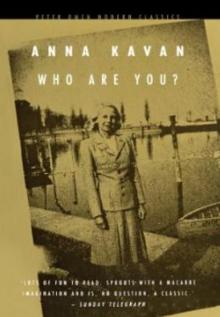 Who Are You?
Who Are You?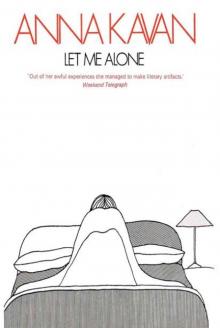 Let Me Alone
Let Me Alone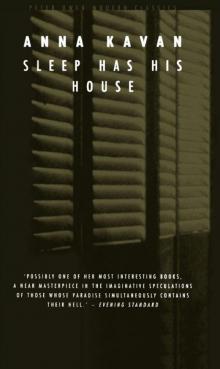 Sleep Has His House
Sleep Has His House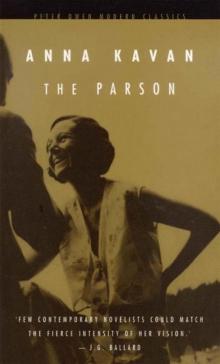 The Parson (Peter Owen Modern Classic)
The Parson (Peter Owen Modern Classic)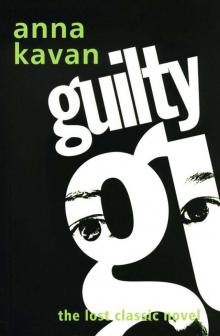 Guilty: The Lost Classic Novel
Guilty: The Lost Classic Novel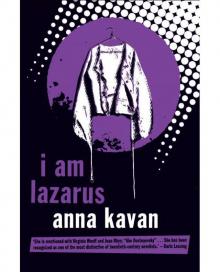 I Am Lazarus (Peter Owen Modern Classic)
I Am Lazarus (Peter Owen Modern Classic)